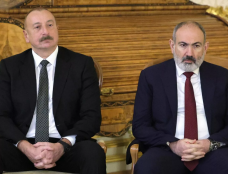
Mattis resigning as Pentagon chief after clashes with Trump
Defense Secretary Jim Mattis resigned Thursday after clashing with President Donald Trump over the abrupt withdrawal of U.S. troops from Syria and after two years of deep disagreements over America’s role in the world, AP reports.
Mattis, perhaps the most respected foreign policy official in Trump’s administration, will leave by the end of February after two tumultuous years struggling to soften and moderate the president’s hardline and sometimes sharply changing policies. He told Trump in a letter that he was leaving because “you have a right to have a Secretary of Defense whose views are better aligned with yours.”
Mattis went to the White House with his resignation letter in hand to meet with the president and spoke to Trump for about 45 minutes, according to a senior U.S. official familiar with the incident but speaking on conditions of anonymity to discuss a private meeting.
There was no confrontation between the two men, the official said, and there was no one issue that caused the resignation. However, the official said, Syria likely was the last straw for Mattis.
Mattis did not mention the dispute over Syria in his letter or proposed deep cuts to U.S. forces in Afghanistan, another significant policy dispute. He noted his “core belief” that American strength is “inextricably linked” with the nation’s alliances with other countries, a position seemingly at odds with the “America First” policy of the president.
The defense secretary also said China and Russia want to spread their “authoritarian model” and promote their interests at the expense of America and its allies. “That is why we must use all the tools of American power to provide for the common defense,” he wrote.
The announcement came a day after Trump surprised U.S. allies and members of Congress by announcing the withdrawal of all U.S. troops from Syria, and as he continues to consider cutting in half the American deployment in Afghanistan by this summer. The news coincided with domestic turmoil as well, Trump’s fight with Congress over a border wall and a looming partial government shutdown.
Trump’s decision to pull troops out of Syria has been sharply criticized for abandoning America’s Kurdish allies, who may well face a Turkish assault once U.S. troops leave, and had been staunchly opposed by the Pentagon.
Mattis, in his resignation letter, emphasized the importance of standing up for U.S. allies — an implicit criticism of the president’s decision on this issue and others.
“While the U.S. remains the indispensable nation in the free world, we cannot protect our interests or serve that role effectively without maintaining strong alliances and showing respect to those allies,” Mattis wrote.
His departure has long been rumored, but officials close to him have insisted that the battle-hardened retired Marine would hang on, determined to bring military calm and judgment to the administration’s often chaotic national security decisions and to soften some of Trump’s sharper tones with allies.
Opponents of Mattis, however, have seen him as an unwanted check on Trump.
Mattis went to the White House Thursday afternoon to resign after failing to persuade the president in a tense Oval Office meeting to change his decision on withdrawing troops from Syria, according to two people with knowledge of the conversation but not authorized to discuss it publicly.
Another U.S. official said that Mattis’ decision was his own, and not a “forced resignation.” The official spoke on condition of anonymity to discuss internal deliberations.
Trump said a replacement would be chosen soon.
Newsfeed
Videos






























